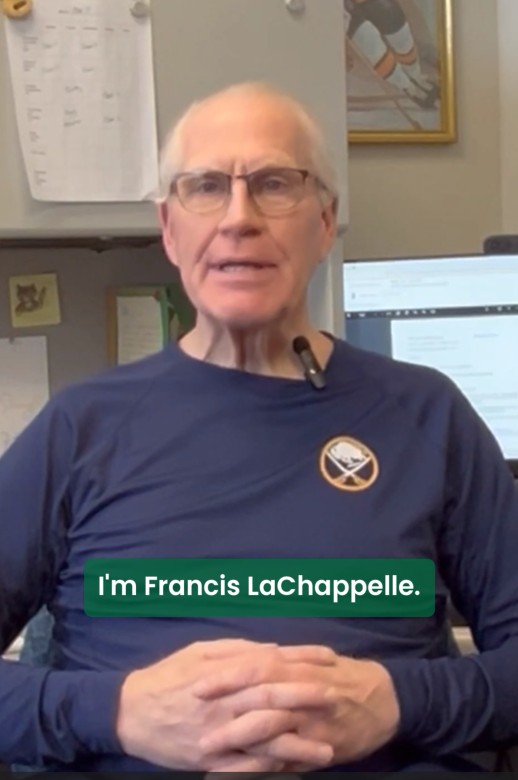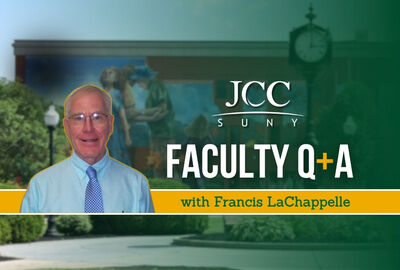Francis LaChappelle is a Human Services assistant professor at SUNY Jamestown Community College. He has taught at JCC since 2003 and joined the full-time faculty in 2012, leading courses in human services, psychology, and addictions counseling.
LaChappelle also has 30 years of professional experience in the human services field.
What is your favorite class you teach at JCC?
LaChappelle: It would be generalist practice skills, which is pretty much an introduction to case management for human service workers and social workers. I like that because I spent 24 years in human services prior to coming here full time.
It allows me to really use my experiences. In fact, sometimes I get talking so much I have to control that so we can get to the book part of it.
I have students that have graduated come back and speak to that class. And that's the one class that they reference the most, too.
Why did you pursue human services and counseling as a career?
LaChappelle: I was in high school and my father was a physical therapist. He was working for the state of Wisconsin and they privatized their physical therapy services. As he was setting up his own business, he was working at a place called the Lorenz Institute in Eau Claire, Wisconsin, where I was raised.
And that was a home like Randolph children's home here in our area. I was asking him questions about that. And he says, ‘Well, most of those kids are emotionally disturbed.’
And I said, well, ‘What does that mean?’ Well, my dad was schooled in the old Socratic method, so it was just question and answer. Sometimes that was quite frustrating. But I kept answering his questions and then he just kind of leaned back and says, ‘Well, maybe you should think about being a counselor someday.’

How has your professional experience in human services and counseling influenced your teaching?
LaChappelle: I think I do a good job of explaining my experiences in such a way that the students can just not benefit from it, but learn from it.
When I was a student – and this is not a criticism, but a comparison – usually on the first or second day of class, I could tell right away if that teacher had experience in the field or if he or she was just teaching from the book. They were both beneficial to my development.
But those people with experience are the ones that I seem to attach to. So, we could relate.
What’s your message to high school students who are considering taking classes at JCC?
LaChappelle: If they're planning on transferring and securing a four year degree, they're going to save a considerable amount of money (at JCC). Not only that, but we know that at four-year schools, something like 30 to 40 percent of those students will change their major at the end of their sophomore year. And we know that there's a good percentage here that either come in undecided and then declare a major at the end of their freshman year or make that decision to change their major.
So we start to see similar statistics. We see over a third of our 18-year-olds coming into higher education are changing their minds or coming in undecided. This gives them a safe chance in an inexpensive way to try an introduction course.
What career options are popular in human services?
LaChappelle: Our president, Daniel DeMarte, has put increased emphasis on (Addictions Counseling). Unfortunately, it's a growing trend in our society.
In the late '70s, I was working with heroin addicts in Detroit. I never would have predicted this, what we're dealing with today, to where these dangerous and powerful drugs are now crossing into everybody's life. It’s not an inner-city problem anymore.
And those substances are very, very powerful. And people that know how to work with people that are in recovery, they can be (vital). And we have a better understanding of what's going on in the brain. We know how these drugs work. We find these replacement drugs. So, there's increased hope.
But hopefully we'll be able to train our future students to be able to go in and work with people in recovery so that they can stay abstinent.
What are some of your favorite research projects you’ve been involved with?
LaChappelle: I'm just finishing it. I'm looking at retention factors (for college students). Has the retention factors changed since the pandemic? So many things, just not here at JCC, but at every college and university in the United States was impacted by the pandemic. And it resulted in a change of our wider variety of teaching modalities that are available to both us and the students.
I really wanted to look at it because so many of the high school kids, when the pandemic hit, suffered. There were increases in depression and anxiety. Our freshmen and sophomores right now, they were freshmen and sophomore high school in the pandemic. So they lived through it just like we did.
And so I'm very curious to see, has it impacted retention? If it has negatively impacted retention, what are those factors that can be identified and addressed?
What does a quality education mean to you?
LaChappelle: It means we prepared our students to go out and take a professional job. I mean, to be able to interview and secure that job and know exactly what they're doing. I mean, you have to get experience.
And there's, you know, if we make mistakes, it's usually in our first year. But just so they're prepared to go out there and do the things that I've taught them to do.
----
JCC offers A.S. Human Services and A.A.S Human Services degree programs. Request more information about those and other JCC learning opportunities.

